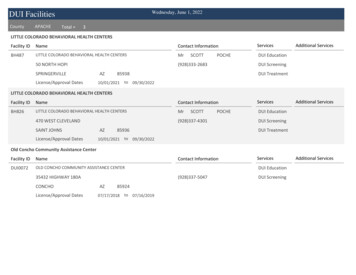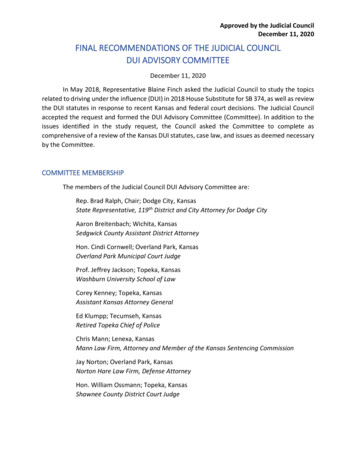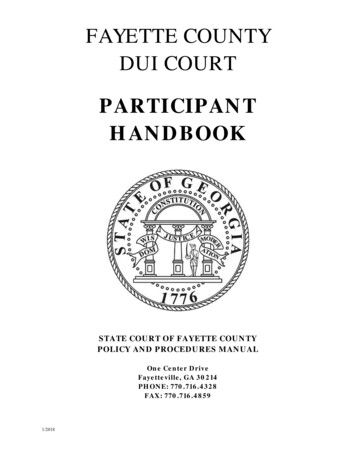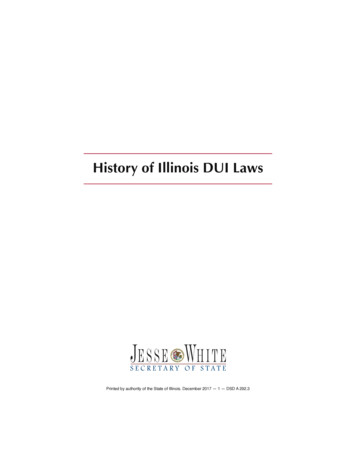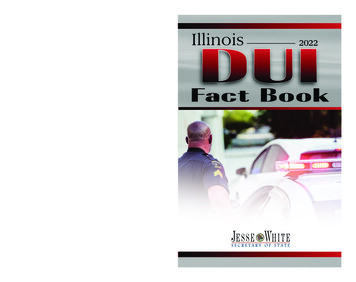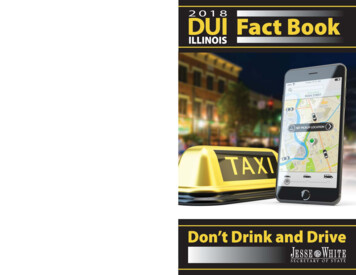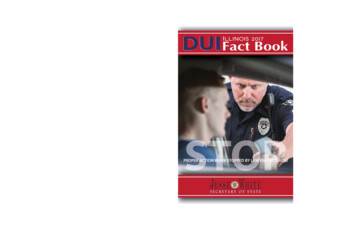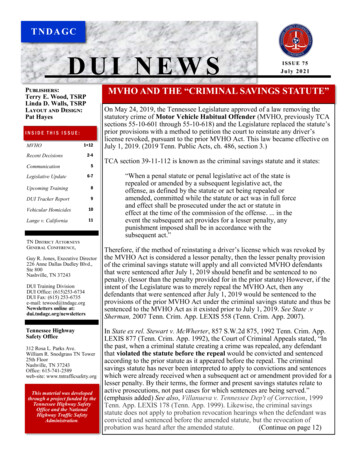
Transcription
TNDAGCDUI NEWSMVHO AND THE “CRIMINAL SAVINGS STATUTE”Publishers:Terry E. Wood, TSRPLinda D. Walls, TSRPLayout and Design:Pat HayesINSIDE THIS ISSUE:MVHO1 12Recent DecisionsCommunicationLegislative UpdateJuly 20212-456-7Upcoming Training8DUI Tracker Report9Vehicular Homicides10Lange v. California11TN District AttorneysGeneral Conference,Guy R. Jones, Executive Director226 Anne Dallas Dudley Blvd.,Ste 800Nashville, TN 37243DUI Training DivisionDUI Office: (615)253-6734DUI Fax: (615) 253-6735e-mail: tewood@tndagc.orgNewsletters online at:dui.tndagc.org/newslettersTennessee HighwaySafety Office312 Rosa L. Parks Ave.William R. Snodgrass TN Tower25th FloorNashville, TN 37243Office: 615-741-2589web-site: www.tntrafficsafety.orgThis material was developedthrough a project funded by theTennessee Highway SafetyOffice and the NationalHighway Traffic SafetyAdministration.On May 24, 2019, the Tennessee Legislature approved of a law removing thestatutory crime of Motor Vehicle Habitual Offender (MVHO, previously TCAsections 55-10-601 through 55-10-618) and the Legislature replaced the statute’sprior provisions with a method to petition the court to reinstate any driver’slicense revoked, pursuant to the prior MVHO Act. This law became effective onJuly 1, 2019. (2019 Tenn. Public Acts, ch. 486, section 3.)TCA section 39-11-112 is known as the criminal savings statute and it states:“When a penal statute or penal legislative act of the state isrepealed or amended by a subsequent legislative act, theoffense, as defined by the statute or act being repealed oramended, committed while the statute or act was in full forceand effect shall be prosecuted under the act or statute ineffect at the time of the commission of the offense. . in theevent the subsequent act provides for a lesser penalty, anypunishment imposed shall be in accordance with thesubsequent act.”Therefore, if the method of reinstating a driver’s license which was revoked bythe MVHO Act is considered a lessor penalty, then the lesser penalty provisionof the criminal savings statute will apply and all convicted MVHO defendantsthat were sentenced after July 1, 2019 should benefit and be sentenced to nopenalty. (lessor than the penalty provided for in the prior statute) However, if theintent of the Legislature was to merely repeal the MVHO Act, then anydefendants that were sentenced after July 1, 2019 would be sentenced to theprovisions of the prior MVHO Act under the criminal savings statute and thus besentenced to the MVHO Act as it existed prior to July 1, 2019. See State .vSherman, 2007 Tenn. Crim. App. LEXIS 558 (Tenn. Crim. App. 2007).In State ex rel. Stewart v. McWherter, 857 S.W.2d 875, 1992 Tenn. Crim. App.LEXIS 877 (Tenn. Crim. App. 1992), the Court of Criminal Appeals stated, “Inthe past, when a criminal statute creating a crime was repealed, any defendantthat violated the statute before the repeal would be convicted and sentencedaccording to the prior statute as it appeared before the repeal. The criminalsavings statute has never been interpreted to apply to convictions and sentenceswhich were already received when a subsequent act or amendment provided for alesser penalty. By their terms, the former and present savings statutes relate toactive prosecutions, not past cases for which sentences are being served.”(emphasis added) See also, Villanueva v. Tennessee Dep't of Correction, 1999Tenn. App. LEXIS 178 (Tenn. App. 1999). Likewise, the criminal savingsstatute does not apply to probation revocation hearings when the defendant wasconvicted and sentenced before the amended statute, but the revocation ofprobation was heard after the amended statute.(Continue on page 12)
DUI NewsPage 2RECENT DECISIONSState v. Tharcisse John Nkurunziza, 2021 Tenn. Crim. App. LEXIS 180This case involved the appropriateness of sentencing enhancements used to determine the sentence length on acharge of vehicular assault. Mr. Nkurunziza was indicted for Vehicular Assault, Reckless Driving, DUI per se,DUI and Failure to Provide Proof of Financial Responsibility. Mr. Nkurunziza pled guilty to the VehicularAssault charge and requested a sentencing hearing. On April 5, 2017, Mr. Nkurunziza drove his ChevroletImpala the wrong direction on I-40 eastbound, near Ashville Highway, causing a head-on collision with aFord SUV. A search warrant for a blood draw was obtained, three hours later, and Mr. Nkurunziza’s BACwas .207 gram percent. The victim, Mr. Tedder received many leg fractures which required extensivetreatment, surgeries and rehabilitation. Medical records indicated Mr. Nkurunziza’s BAC to be .237, twohours after the crash. Mr. Nkurunziza told medical staff, “I drink for a living.”The trial court sentenced Mr. Nkurunziza as a Range I, standard offender to four years to be served as tenmonths in jail, followed by supervised probation. Mr. Nkurunziza appealed the sentence, claiming that thesentence was excessive, because the trial court misapplied all three enhancement factors that it relied upon.The State acknowledged that the trial court did misapply enhancement factors (1) a previous history ofcriminal convictions or criminal behavior, and (6) the personal injuries inflicted upon the victim wereparticularly great, even though the State argued for them during the sentencing hearing. However, the trialcourt did properly apply enhancement (10) the defendant had no hesitation about committing a crime when therisk to human life was high. Also, the record supported the trial court’s denial of full probation.The standard of review is an abuse of discretion with a presumption of reasonableness. State v. Bise, 380S.W.3d 682, 708 (Tenn. 2012). Although the trial court should consider enhancement and mitigating factors,the statutory factors are advisory only. See Tenn. Code Ann. section 40-35-114; see also Bise, 380 S.W.3d at701. Although enhancement factor (10) does not apply to vehicular assault, unless the record does indicatethat any other person was actually threatened by the defendant’s driving. State v. Rhodes, 917 S.W.2d 708,714 (Tenn. Crim. App. 1995). It is appropriate, as in this case, when the defendant crossed over into theopposite lanes on an interstate, in an urban area, and strikes a vehicle head-on. State v. Davis Oliver Brown,No. 03C01-9608-CR-00313, 1997 WL 785671, at *3 (ten. Crim. App. At Knoxville, Dec. 16, 1997). Thejudgment of the trial court was affirmed.State v. Jamie Lee Blankenship, 2021 Tenn. Crim. App. LEXIS 197On January 19, 2018, Mr. Blankenship pled guilty to MVHO and DUI second offense. He was sentenced toone year, six months at thirty percent release eligibility for the MVHO charge and eleven months, 29 days,after service of 45 days jail on the DUI charge. The sentences were to run concurrent. Mr. Blankenship wasreleased on probation, after approximately five months in the workhouse, and shortly thereafter, violated hisprobation (by never reporting). The trial court ordered Mr. Blankenship to serve the remainder of his sentenceand the defendant appealed, claiming that he should have been given split confinement followed byreinstatement of probation for an extended duration.Probation revocation rests in the sound discretion of the trial court and will not be overturned by this court,absent an abuse of that discretion. State v. Leach, 914 S.W.2d 104, 106 (Tenn. Crim. App. 1995). As this courthas repeatedly cautioned, "[A]n accused, already on probation, is not entitled to a second grant of probation oranother form of alternative sentencing." State v. Jeffrey A. Warfield, No. 01C01-9711-CC-00504, 1999 Tenn.Crim. App. LEXIS 115, 1999 WL 61065, at *2 (Tenn. Crim. App. at Nashville, Feb. 10, 1999); see also Statev. Timothy A. Johnson, No. M2001-01362-CCA-R3-CD, 2002 Tenn. Crim. App. LEXIS 136, 2002 WL242351, at *2 (Tenn. Crim. App. at Nashville, Feb. 11, 2002). Trial courts are given great latitude duringrevocation of probation violation rulings and any subsequent sentencing decisions. Therefore, the Court ofCriminal Appeals affirmed the judgments of the trial court.(Continued on page 3)Visit our website at: http://dui.tndagc.org
DUI NewsPage 3RECENT DECISIONS (Continued)State v. Cedarius J. Robertson, 2021 Tenn. Crim. App. LEXIS 245Mr. Robertson, was convicted by a jury, in Madison County, of being a Convicted Felon in Possession of aFirearm, a class B felony; Tampering with Evidence, a class C felony; Driving under the influence (DUI) andDUI per se, class A misdemeanors; Possessing a Handgun while Under the Influence, a class A misdemeanor;and Failing to Maintain his Lane of Travel, a class C misdemeanor. After a sentencing hearing, the trial courtmerged the DUI convictions and ordered that he serve an effective thirteen-year sentence in confinement. Mr.Robertson appealed, based upon insufficiency of the evidence.On September 30, 2018, Trooper Jones observed a black Chevrolet Silverado moving from one lane toanother, crossing both the center dividing line and the fog line. Trooper Jones turned on his blue lights, butMr. Robertson did not stop until he turned into a liquor store, which was “quite a ways” from the initialattempted traffic stop. Trooper Jones immediately smelled alcohol coming from inside the vehicle and he sawa pistol on the floor board at Mr. Robertson’s feet. Mr. Robertson was removed from his vehicle and putunhandcuffed in the back of Trooper Jones’ vehicle. Mr. Robertson stated that he “drank some beer, had acouple of shots, and he knew he was drunk.” Mr. Robertson was too intoxicated to finish the SFSTs. Mr.Robertson was “extremely cooperative” and he consented to a blood draw, which was conducted three-hoursafter the traffic stop. His BAC was .145 gram percent. On appeal, Mr. Robertson claimed that he was “sounder the influence that it contributed to his inability to perceive what was on the floor board of his truck.”When an appellant challenges the sufficiency of the convicting evidence, the standard for review, by anappellate court, is "whether, after viewing the evidence in the light most favorable to the prosecution,any rational trier of fact could have found the essential elements of the crime beyond a reasonable doubt.”Jackson v. Virginia, 443 U.S. 307, 319, 99 S. Ct. 2781, 61 L. Ed. 2d 560 (1979); Tenn. R. App. P. 13(e). TheCCA found sufficient evidence existed and affirmed the judgments of the trial court.State v. Eric Manzenberger, 2021 Tenn. Crim. App. LEXIS 250Mr. Manzenberger was stopped for Speeding and having a Malfunctioning Brake Light, but after furtherinvestigation and his poor performance on SFSTs, he was ultimately charged with DUI. The defense filed amotion to suppress several statements that he made to law enforcement during the traffic stop, since he wasnot informed of his right to remain silent. Mr. Manzenberger asked the officer, “what would happen if hedeclined to perform SFSTs,” and the officer said that he would be “placed under arrest.” The defense arguesthat he was in custody from that point on and he should have been read Miranda rights. After the SFSTs wereperformed, the officer continued to ask Mr. Manzenberger about how much he had to drink, if he felt “buzzedor anything.” The officer then asked, “On a scale of zero to ten, zero being completely sober and ten beingreally, really drunk, how do you feel right now?”; and Mr. Manzenberger answered “Three.”“Miranda warnings are required only when a suspect is subjected questioning or its functional equivalentwhile in custody.” State v. Walton, 41 S.W.3d 75, 82 (Tenn. 2001). Both parties agreed that Mr. Manzenbergerwas being questioned during the traffic stop. Therefore, the only question is whether Mr. Manzenbereger wasconsidered in custody during the questioning. The custody analysis requires determining "whether, under thetotality of the circumstances, a reasonable person in the suspect's position would consider himself or herselfdeprived of freedom of movement to a degree associated with a formal arrest." State v. Anderson, 937 S.W.2d851, 855 (Tenn. 1996). The United States Supreme Court has stated that a person is not “in custody” for thepurposes of Miranda when the person is temporarily detained for a traffic stop, “including one involvingintoxication.” Berkemer v. McCarty, 468 U.S. 420, 436 (1984). The CCA determined that a reasonable personin Mr. Manzenberger’s situation would conclude that the officer’s determination regarding whether to arrestthe defendant was being delayed until the officer had furthered his investigation. See Abrahamson v. State, 623S.E.2d 764, 767 (Ga. Ct. App. 2005). The judgments were affirmed.(Continued on page 4)Visit our website at: http://dui.tndagc.org
DUI NewsPage 4RECENT DECISIONS (Continued)State v. James Michael Martin, 2021 Tenn. Crim. App. LEXIS 256On August 3, 2017, Mr. Martin was involved in a single car crash, when his vehicle left the roadway andbecame wedged in a wooded area at the bottom of a ravine. After an hour and a half, Mr. Martin wasrescued from his vehicle. Officers at the scene observed signs of impairment and Mr. Martin admitted todrinking “four or five beers” and taking Oxycodone earlier in the evening. Mr. Martin performed poorly onthe SFSTs and he could not complete them. Mr. Martin consented to giving a blood sample and his BAC was0.147 gram percent. Mr. Martin filed a motion to dismiss because a video of the SFSTs could not be located.The officer believes that a tape was made, but he is not certain, because the department was changing videotechnology at the time. Mr. Martin argued that the State should have a duty to video record all encountersbetween law enforcement and suspects. “However, there is no general requirement for law enforcement toelectronically record their activity, State v. Godsey, 60 S.W.3d 759, 771 (Tenn. 2001), or to conduct anyparticular type of investigation, or utilize any particular investigative technique. State v. Brock, 327 S.W.3d645, 698 (Tenn. Crim. App. 2009) (quoting State v. Best, No. E2007-00296-CCA-R3-CD, 2008 Tenn. Crim.App. LEXIS 744, 2008 WL 4367529, at *13 (Tenn. Crim. App. Sept. 25, 2008)); See also, State v.Pendergrass, No. E2013-01409-CCA-R3-CD, 2014 Tenn. Crim. App. LEXIS 260, 2014 WL 1232204, at *7(Tenn. Crim. App. Mar. 25, 2014), perm. app. denied (Tenn. Aug. 26, 2014) (noting that Ferguson "does notrequire the creation of evidence").The CCA discussed the standards set in State v. Merriman, 410 S.W.3d 779 (Tenn. 2013) as applied to State v.Ferguson, 2 S.W.3d 912 (Tenn. 1999). Since the jury convicted Mr. Martin of DUI per se, his performance onSFSTs, even if contradictory to the officer’s testimony, would have no bearing on the concentration of alcoholin his blood. The video was immaterial. The CCA also allowed statements made to the nurse as being made toa third party and not at the direction of the officer. The judgments of the trial court were affirmed.State v. Riley Christopher Wilburn, 2021 Tenn. Crim. App. LEXIS 278Mr. Wilburn was convicted of DUI by a Giles County Circuit Court jury. On appeal, Mr. Wilburn contendsthat the trial court erred in denying his motion to dismiss on the basis that the indictment was fatally flawed,because it alleged two offenses in a single count. (DUI and DUI per se). The CCA was asked to determine ifDUI by intoxication and DUI per se are separate offenses, which must be charged by separate counts of anindictment, or whether they may be alleged alternatively in a single-count and, whether juror unanimity isrequired as to the specific means by which a defendant commits the offense, when they are chargeddisjunctively in a single-count indictment.The CCA stated, "When the offense may be committed by different forms, by different means or withdifferent intents, the forms, means or intents may be alleged in the same count in the alternative." T.C.A.§ 40-13-206(a) (2018). It was noted that DUI is a continuing crime and when DUI is charged in separatecounts of an indictment alleging alternate theories, the convictions for the separate counts are merged into asingle judgment of conviction. See, e.g., State v. Cooper, 336 S.W.3d 522, 524 (Tenn. 2011) (holding thatseparate judgments of conviction for DUI by intoxication and DUI per se arising from the same incidentviolates double jeopardy and that the convictions must be merged into a single judgment).The CCA Concluded, in accord with the legislative history and previous judicial interpretations of the DUIstatute, that DUI by intoxication and DUI per se are alternative means of committing DUI, not separateoffenses. Also, with respect to the issue of juror unanimity, the CCA concluded that because Mr. Wilburn wascharged with a single offense, he is not entitled to juror unanimity as to the particular mode or modes of theoffense which the jury found he committed. See T.C.A. § 40-18-112 (holding that juror certainty as to thesame intent, mode or mean is not required to convict if they agree that the act was committed). See also, Statev. Adams, 24 S.W.3d 289 (Tenn. 2000); State v. Lemacks, 996 S.W.2d 166 (Tenn. 1999). Judgments affirmed.Visit our website at: http://dui.tndagc.org
DUI NewsPage 5THE NEED FOR GOOD COMMUNICATIONWhether prosecutors realize it or not, communication requires the complete development of effectivelistening and speaking skills. Why is listening important? Simply stated, we must listen to witnesses in orderto convey information to a third-party, without distorting or redefining the details of what happened. It is thecornerstone of our jobs as prosecutors to seek and present the truth to the jury, so that justice may be done.Communication is defined by the Oxford English Dictionary as “[t]he imparting or exchanging of informationby speaking, writing, or using some other medium” or “[t]he successful conveying or sharing of ideas andfeelings.” (Oxford Dictionary Online, May 29, 2018, 9:05 AM). The word communication originated in Latinfrom the noun “communicatio” which was formed from the verb “communicare” meaning “to share”. (GoogleDictionary, May 29, 2018, 9:28 AM).As prosecutors, we need to formulate questions that elicit descriptive testimony. It is not enough for a witnessto say a “white, pickup truck” when more descriptive language like “a white, quad-cab GMC pickup truckwith a large dent in the driver’s side door, just below the door handle” would provide for a more completevisualization of what the witness saw. Repeating the description provided by the witness in the next questionhelps the jury get a mental picture of the action, “When you saw this white, quad-cab GMC pickup truck withthe large dent in the driver’s side door, just below the door handle, as you described it, did you see any othercars or trucks on the roadway?” Now, think about the testimony you elicited from the witness and add in thephotographic evidence (if there is such evidence), that matches that description. Isn’t the testimony incombination with the photographs of the described pickup truck more powerful? Doesn’t this descriptionsupport the credibility of your witness with the jury?The more information we hear, absorb, and re-communicate accurately to the jury, the better. That is why it isimportant to meet with and listen to each witness before trial. During the pre-trial meetings, we should notinterject any information into the conversation that potentially could alter or distort the memory of the witness.The best practice is to listen first and then ask questions based on what the witness tells us. Always comparethe information provided in the conversation with any prior statements made by the witness to lawenforcement. If the statements given to law enforcement seems to be more detailed, or varies in minor wayswith what the witness says during the pre-trial meeting, or omits some details provided in the meeting, then itmay be necessary to discuss those issues with the witness in such a way as to encourage open and honestcommunication regarding the completeness and accuracy of the information provided within those priorstatements. Addressing any issues with witness memory or statement accuracy at the pretrial meeting willreduce anxiety and reduce the chance that omissions or additions to testimony at trial will catch a prosecutoroff-guard and/or potentially cause a mistrial.Ultimately, it is our job to communicate the facts of a case to the jury through the witnesses and evidencepresented at trial. The rules of evidence and ethics permit prosecutors to make reasonable inferences from theevidence presented in the case, but there are limitations. For instance, a prosecutor cannot misstate theevidence, speak to the credibility of witnesses, or refer to matters not within the court record. Therefore, it isof the utmost importance that we listen to the evidence presented at trial, make note of that evidence, andreconvey this information in summation honestly, completely, and accurately.So, the next time you meet with any witness, whether the witness is law enforcement, a lay witness, or anexpert witness in crash reconstruction, toxicology, etc.; listen first and then ask questions for clarification. Ifyou follow this pre-trial interview plan, you just may get a clearer understanding of just how the witness’stestimony helps prove your case, beyond a reasonable doubt, and better communicate that understanding andinformation to the jury at trial.Visit our website at: http://dui.tndagc.org
DUI NewsPage 6LEGISLATIVE UPDATEThe 112th Tennessee General Assembly convened on January 12, 2021 and adjourned on May 5, 2021. Duringthe four-month term, the general assembly addressed a variety of issues related to traffic safety, motorvehicles, and/or regarding driver’s license issuance.First, Public Chapter 55, the 2021 Precious Cargo Act was passed to “empower citizens to communicatespecific needs to law enforcement and first responders.” Essentially, this law will permit an owner or lessee ofa motor vehicle who needs assistance, with expressive language or communicating needs to a first responder,or who needs assistance with exiting a motor vehicle; to request, at the time of initial application or renewal ofregistration, a special designation of that need, in the Tennessee Vehicle Title and Registration System(VTRS). Special documentation from a healthcare provider as outlined in the act, would be required at thetime the owner or lessee makes the request. This information would be made available to law enforcement,only for the purpose of ensuring safe and efficient response and interactions with those in need. This act willtake effect on January 1, 2022.On March 29, 2021, Governor Lee signed Public Chapter 56, specifically providing that an electric wheelchairis not a motor vehicle for the purposes of Title 55. This act was effective upon Governor Lee’s signature.Prior to the enactment of Public Chapter 105 on April 7, 2021, a juvenile charged with delinquent act of theftof a motor vehicle, under Tennessee Code Annotated §39-14-103, would not trigger a placement in a securedetention facility absent other facts/factors. After the enactment, however, courts are given that option, if thereis probable cause to support the delinquent petition. This public chapter took effect when it was signed byGovernor Lee on April 7, 2021.When Public Chapter 108 was enacted on April 8, 2021, most people focused on the expansion of thosepermitted to carry a handgun, openly or concealed, and where it may be done, and not on other provisions ofthe act, related to those who will now be prohibit from carrying a firearm with the intent to go armed. The actamended T.C.A. § 39-17-1307 to add those convicted of driving under the influence of an intoxicant, two (2)or more times within the prior ten (10) years, or one (1) time within the prior five (5) years, as those prohibitedfrom carrying a firearm, with the intent to go armed. This act goes into effect on July 1, 2021.For those convicted of a human trafficking offense, as defined in T.C.A. § 39-13-314 or an equivalent offensein another jurisdiction, Public Chapter 112 provides for suspension for life or disqualification from obtaining acommercial driver’s license (CDL). This act went into effect on April 13, 2021.Trailer hitch balls are a common vehicle accessory here in Tennessee. Recognizing that some trailer hitchballs are mounted in front of registration plates, on a number of those vehicles, Public Chapter 174, effectiveon April 20, 2021, provides that this cannot be considered when determining whether a license plate orregistration sticker is clearly visible for purposes of T.C.A. § 55-4-110.Signed by Governor Lee on April 20, 2021, Public Chapter 176 provides that occupants on autocycles that arenot fully enclosed must wear a helmet beginning on July 1, 2021.License plate readers and privacy are the focus of Public Chapter 201. Effective April 22, 2021, this actprovides that captured plate data from automatic license plate reader systems must be treated as confidentialand not open for inspection by members of the public, under T.C.A. § 10-7-504.Beginning on July 1, 2021, members of the general assembly may request, in writing, copies of crash reportsfor crashes resulting a person’s death, in the member’s district. Public Chapter 225 does provide that a crashreport that is subject to an on-going investigation or court order requiring the information, to remainConfidential, and shall not be released and that federal and state privacy laws (Continued on page 7)Visit our website at: http://dui.tndagc.org
DUI NewsPage 7LEGISLATIVE UPDATE (Continued)regarding identifiable information, apply to the reports released to members of the general assembly.Recovery and tow vehicles responding to an emergency call from a law enforcement agency, may lawfully usethe shoulder of the roadway to get through traffic. Public Chapter 243 was signed by Governor Lee and wentinto effect on April 28, 2021.The dangers posed by those evading arrest and resulting damages have been a concern of the general assemblyfor the past few years. This year was no exception. Public Chapter 278, the Spencer Bristol Act, enacted inresponse to the death of Spencer Bristol, of the Hendersonville Police Department, makes evading arrest aclass C felony if it results in bodily injury to a law enforcement officer and a class A felony if it results in thedeath of a law enforcement officer, regardless of whether the defendant evaded on foot or by motor vehicle.Further, the act provides mandatory confinement in cases involving evading arrest by a motor vehicle. This acttakes effect on July 1, 2021.Photographic evidence of a fatal motor vehicle accident that depicts a deceased minor victim shall be treatedas confidential and not open for inspection by members of the public, unless the custodial parent or legalguardian waives confidentiality, under Public Chapter 304. This act, of course, does not restrict Rule 16disclosure requirements and does not deny or limit access to other information related to the motor vehiclecrash, that is open to public inspection. This act takes effect on July 1, 2021.Owners, occupants, or others having lawful right to the exclusive use and enjoyment of property, whoknowingly allow a person, under 21 years of age, to consume alcoholic beverages on their property, will becommitting a class A misdemeanor and could lose or be denied driving privileges at the discretion of the courthaving jurisdiction over the defendant, under Public Chapter 430. This act takes effect on July 1, 2021.Boating Under the Influence jail penalties were changed to be more in-line with Driving Under the Influencejail penalties, by Public Chapter 434, effective on July 1, 2021. Also, within the act, Vehicular Homicide andVehicular Assault now include boats and other vessels subject to registration under title 69, chapter 9, part 2.The Caitlyn Kaufman Interstate Safety Act, Public Chapter 450, permits the installation of surveillanceCameras, operated by law enforcement agencies for the purpose of aiding in criminal investigations orsearches for missing or endangered persons, to the extent that the use is consistent with the continued use,maintenance, and safety of the highway, does not interfere with the free and safe flow of traffic, and are notused to enforce or monitor state or local traffic violations, or the issuance of traffic citations. This act went intoeffect on May 14, 2021.Beginning on July 1, 2021, forensic analysts, if permitted by the court and the defendant agrees, and otherrequirements are satisfied, may testify remotely in a criminal proceeding, under Public Chapter 501.Public Chapter 505, effective July 1, 2021, makes reckless endangerment by discharging a firearm from withina motor vehicle a class C felony.The definition of an “eligible petitioner” for purposes of expunction, will not include those convicted ofoffenses involving the manufacture, delivery, sale, or possession of a controlled substance and at the time ofthe offense held a commercial driver license or committed the offense within a commercial motor vehicleregardless of the driver’s license held by that person, under Public Chapter 539. Effective July 1, 2021.Finally, with overwhelming support of both houses of the general assembly and Governor Lee, drag racingwill be a class A misdemeanor beginning July 1, 2021, with the enactment of Public Chapter 573. For moredetails regarding these legislative acts, go to resolutions.Visit our website at: http://dui.tndagc.org
DUI NewsPage 8UPCOMING TRAININGTHE UPCOMING TNDAGC DUI TRAINING SCHEDULECops in Court - July 23, 2021, Harrogate, TNThis course teaches law enforcement officers the challenges and difficulties associated with impaired drivingcases. It also includes a mock trail presentation in which each officer experiences a direct and crossexamination. Prosecutors are encouraged to participate in the mock trial present
DUI Tracker Report 9 Vehicular Homicides 10 Lange v. California 11 DUI NEWS This material was developed through a project funded by the Tennessee Highway Safety Office and the National Highway Traffic Safety Administration. Tennessee Highway Safety Office 312 Rosa L. Parks Ave. William R. Snodgrass TN Tower 25th Floor Nashville, TN 37243
